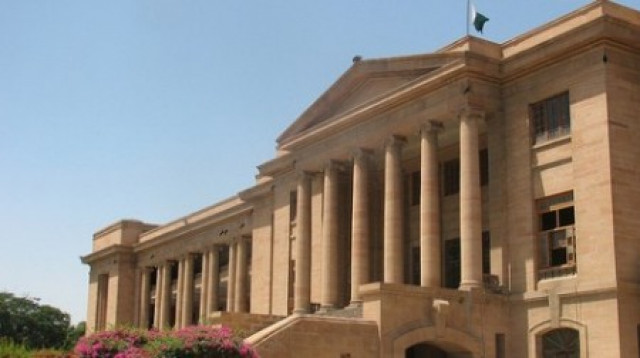Judges shortage: More than 8,000 cases pending at Hyderabad bench of SHC
Two judges are supposed to take up 194 cases today.

Judges shortage: More than 8,000 cases pending at Hyderabad bench of SHC
At present the circuit bench that has a jurisdiction over 13 districts of Sindh is made up of only two judges when there are supposed to be six. These two judges hear about one-third of around 150 cases on the daily cause list. A list of 194 cases has been prepared for the two courtrooms for February 3 (Friday). Four other courtrooms are vacant as they have no judges.
“A continuous build-up of the cases has been witnessed over the past two years or so,” recalls advocate Nisar Durrani, the president of the District Bar Association. “While this affects the whole range of litigants, those involved in the criminal cases are major sufferers.”
The highest number of judges that the Hyderabad bench had was in 2009 when there were four. But with the retirement of some and the elevation of others, the strength was reduced and no addition has been made to complete the bench. This strain caused by the shortage has also delayed the permanent status for the Hyderabad bench as was given to Sukkur.
“After every one and a half or two months the bench changes. Sometimes a judge on the Hyderabad bench is also listed in Karachi. This results in unnecessary delays in the proceedings to the detriment of the litigants and their counsels,” says Durrani.
He alluded to the new appointment procedure through the Judicial Commission as being the cause for the delay in filling the 28 vacant seats of the Sindh High Court which has a sanctioned strength of 40.
For some other lawyers, however, the reason for this situation lies in the rift between the government and the judiciary. “The judges recommended by the government often don’t qualify with from the Judiciary. This is unlike in the Punjab where the judiciary approves the judges recommended by the provincial government,” says a lawyer, who was himself interviewed by Justice Sarmad Jalal Osmany but not selected.
Some lawyers also argue that linguistic preferences are a barrier in appointment too. This contention has been expressed on various occasions by Sindhi lawyers and representatives of the bar. “Justice Imam Bux Baloch, a resident of Sanghar district, was appointed over one and a half years ago but has not been confirmed yet,” said a lawyer. “And, the last one to have been appointed from Hyderabad was Justice (retd) Ghulam Rabbani more than nine years ago.” In December last year, Justice Noorul Haq Qureshi from Hyderabad was also appointed as a judge for the Islamabad High Court.
The situation is not much different at the lower courts. No less than 9,514 cases are pending in the sessions court which is better staffed as it is only one additional judge short. However, the civil court has only 13 out of 20 judges.
“One way to address this shortage in the lower courts is to appoint judges through the Public Service Commission as is being done in the other provinces,” suggests advocate Fazal Qadir Memon, a member of the Sindh Bar Council.
According to advocate Salahuddin Panhwer, a member of the Pakistan Bar Council from Sindh, a summary for the appointment of civil judges has been gathering dust at the Sindh government’s law ministry for eight months.
“Here is not the issue of a judiciary disagreeing on judges recommended by the government,” he says. “Then why are the appointments not being made?”
Published in The Express Tribune, February 3rd, 2012.



















COMMENTS
Comments are moderated and generally will be posted if they are on-topic and not abusive.
For more information, please see our Comments FAQ